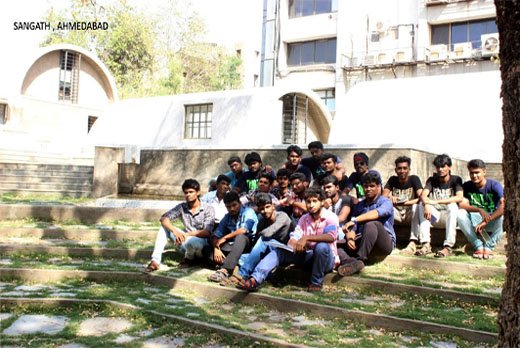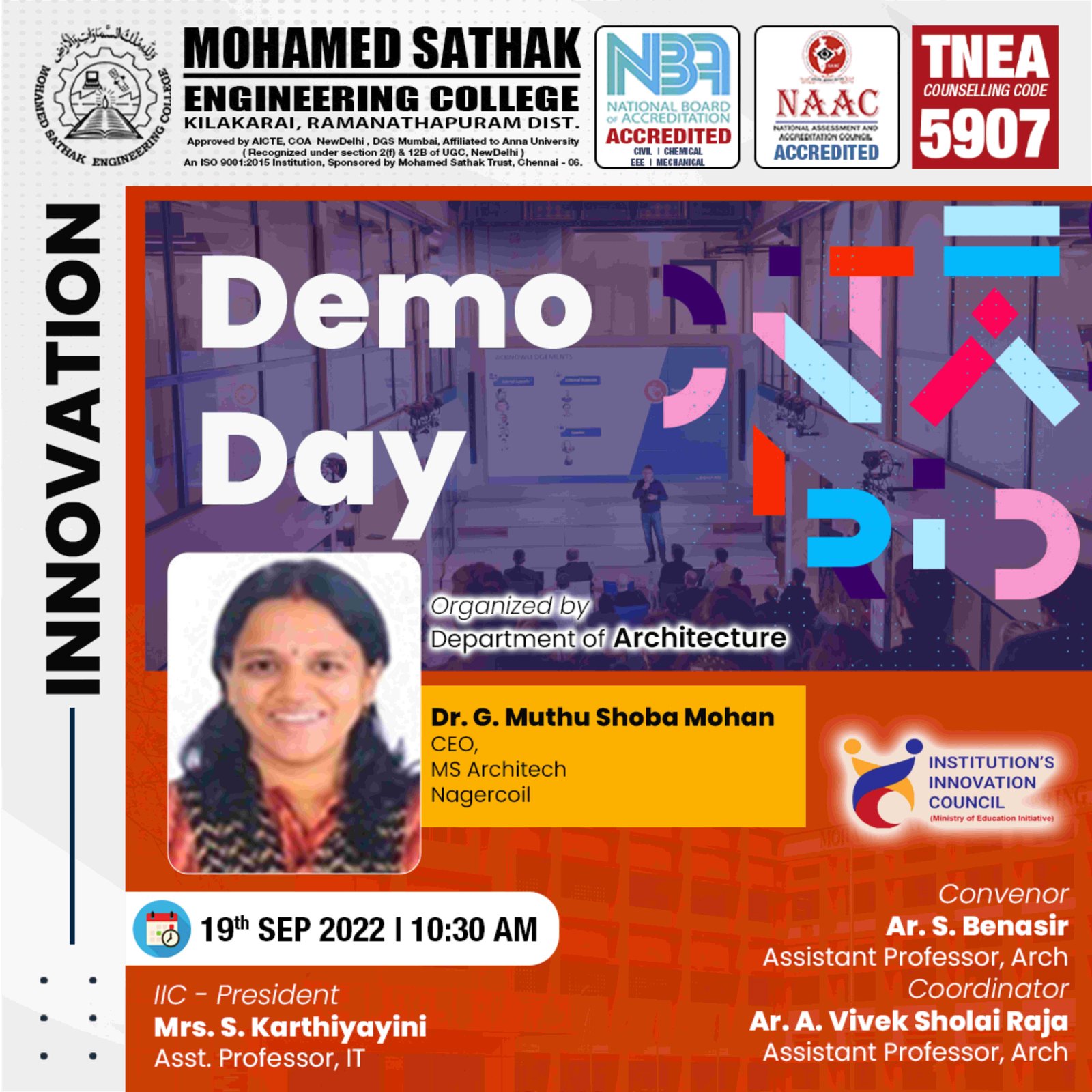Department of Architecture

Overview
Mohamed Sathak Engineering College was one of the FIRST self-financing colleges in Tamil Nadu to start Bachelor of Architecture degree Programme in the year 1993. Mohamed Sathak School of Architecture - MSSA is approved by the Council of Architecture, New Delhi and AICTE and affiliated to Anna University, Chennai. A talented team of professional faculties with Ph.D, Post graduate qualifications in architecture and practicing architects prepare our students to face challenges of the industry with close coordination with the local chapter and center of the Indian Institute of Architects IIA. The students take part in National Association of Students of Architecture (NASA) and state level Zonal NASA every year. Students also attend architecture interschool competitions, carry out a minimum of two case – studies per semester in Real situations, undertake optional educational south India / north India tours and get exposed to the practical developments in the area of Modern / Vernacular Architecture.
In the final year students attend Practical training under a COA certified practicing architect for 6 months to understand the different stages in real life architectural projects in practice. They learn various aspects from initiation of project, development of concepts into schematic drawings, approval process, presentations and working drawings, involvement in office discussions and client meetings, integrating structural and service concerns, estimation and tendering processes, site supervision and coordination in the construction process. They also do a final thesis project for 6months which facilitates to develop their ability to complete and handle projects independently as a precursor to professional life.
Programme
Duration:
5 years (Regular)
No. of Semesters:
10 (Regular)
Intake / No. of Seats:
Total - 40 (Government - 20, Management - 20)
Eligibility:
Eligibility Criteria For B.Arch – Valid Only For 2020-2021
Candidate who have qualified the aptitude test .i.e. NATA or JEE with pass percentage in 10+2 exam with PCM (PHYSICS, CHEMISTRY &MATHEMATICS) subjects or pass in 10+3 diploma with mathematics shall be eligible for admission to B.Arch course for the academic session 2020-2021.
For more information Click here
Career Opportunities:
VISION
To emerge as a “center for excellence” offering Architecture education and research opportunities of very high standards to students, develop total personality of the individual, and instill high levels of discipline and strive to set global standards, making our students technologically superior and ethically strong, who in turn shall contribute for the advancement of society and human kind.
MISSION
To emerge as a “center for excellence” offering Architecture education and research opportunities of very high standards to students, develop total personality of the individual, and instill high levels of discipline and strive to set global standards, making our students technologically superior and ethically strong, who in turn shall contribute for the advancement of society and human kind.
Programme Educational Objectives (PEOs)
| PEO1. | Become a practicing architect who can provide holistic and innovative solutions to needs and problems of society. |
| PEO2. | Find gainful employment in architectural firms/ building sector and contribute in design and decision making. |
| PEO3. | Be a part of organisations that influence policy and contribute to larger changes in society and environment. |
| PEO4. | Contribute to the discipline of architecture through higher studies, research and development. |
| PEO5. | Become a thinker and entrepreneur who can direct creative vision, explorations, services and products towards a better future in an interconnected world. |
Program Specific Outcomes (PSOs)
| PSO1. | To facilitate a successful professional career. |
| PSO2. | To imbibe a strong foundation in Humanities and Sciences, Engineering Sciences and Architectural Design Skills |
| PSO3. | To appreciate the theories and practices in the field of Architecture and design. |
| PSO4. | To update themselves abreast of new developments in the field of architecture through lifelong learning |
| PSO5. | To emulate and inspire high ethical values in professional practice. |
Programme Outcomes (PO)
| PO1. | Engineering knowledge: | Apply the knowledge of mathematics, science, engineering fundamentals, and an engineering specialization to the solution of complex engineering problems. |
| PO2. | Problem analysis: | Identify, formulate, review research literature, and analyze complex engineering problems reaching substantiated conclusions using first principles of mathematics, natural sciences, and engineering sciences. |
| PO3. | Design/development of solutions: | Design solutions for complex engineering problems and design system components or processes that meet the specified needs with appropriate consideration for the public health and safety, and the cultural, societal, and environmental considerations. |
| PO4. | Conduct investigation of complex problem: | Use research-based knowledge and research methods including design of experiments, analysis and interpretation of data, and synthesis of the information to provide valid conclusions. |
| PO5. | Modern tool usage: | Create, select, and apply appropriate techniques, resources, and modern engineering and IT tools including prediction and modeling to complex engineering activities with an understanding of the limitations. |
| PO6. | The Engineer and Society: | Apply reasoning informed by the contextual knowledge to assess societal, health, safety, legal and cultural issues and the consequent responsibilities relevant to the professional engineering practice. |
| PO7. | Environment and sustainability: | Understand the impact of the professional engineering solutions in societal and environmental contexts, and demonstrate the knowledge of, and need for sustainable development. |
| PO8. | Ethics: | Apply ethical principles and commit to professional ethics and responsibilities and norms of the engineering practice. |
| PO9. | Individual and team work: | Function effectively as an individual, and as a member or leader in diverse teams, and in multidisciplinary settings. |
| PO10. | Communication: | Communicate effectively on complex engineering activities with the engineering community and with society at large, such as, being able to comprehend and write effective reports and design documentation, make effective presentations, and give and receive clear instructions. |
| PO11. | Project Management and Finance: | Demonstrate knowledge and understanding of the engineering and management principles and apply these to one’s own work, as a member and leader in a team, to manage projects and in multidisciplinary environments. |
| PO12. | Life-long learning: | Recognize the need for, and have the preparation and ability to engage in independent and life-long learning in the broadest context of technological change. |
NATA
National Aptitude Test in Architecture (NATA) is being conducted by the Council of Architecture, being the competent & final authority for the purpose of fixing norms and standards for architectural institutions and having the necessary expertise to hold a Common Aptitude Test in Architecture, at national level to provide a single window system for appearing in aptitude test and to facilitate institutions, students and public at large for admission to First year of 5 year B.Arch Degree Course at all recognized Institutions all over country.
The National Aptitude Test in Architecture (NATA) measures the aptitude of the applicant for specific field of study, i.e. Architecture. The test measures drawing and observation skills, sense of proportion, aesthetic sensitivity and critical thinking ability that have been acquired over a long period of time, and that are related to specific field of study, i.e. Architecture.
Faculty
| Name | Qualification | Designation | Date of Joining | Nature of Association (Regular / Contract / Adjunct) |
Ar. K. STANLEY CLEMENT DANIEL |
M.Arch | HoD | 01.02.2023 | Regular |
Ar. V. JAISIMMAH |
B.Arch | Design Chair | 19.01.2013 | Regular |
AR. S. BENASIR |
M.Arch., | Associate Professor | 02.07.2012 | Regular |
AR. A. VIVEK SHOLAI RAJA |
M.Arch., | Associate Professor | 28.12.2020 | Regular |
Ar. V. VINOTHKUMAR |
M.Arch | Associate Professor | 28.12.2020 | Regular |
Ar. S. UMAPATHI |
M.Arch | Associate Professor | 22.08.2022 | Regular |
Ar. A. AZHAGU RANI |
B.Arch | Assistant Professor | 13.09.2022 | Regular |
Ar. B. ATHMA YAZHINI |
B.Arch | Assistant Professor | 25.06.2019 | Regular |
Ar. M. FAZILATHUN NISHA |
B.Arch | Assistant Professor | 14.03.2022 | Regular |
Ar. A. SYED IBRAHIM |
B.Arch | Assistant Professor | 02.03.2022 | Regular |
Ar. B. ANUPRIYA |
B.Arch | Assistant Professor | 05.08.2024 | Regular |
Ar. H. SATHAKUN ROOHI |
B.Arch | Assistant Professor | 05.08.2024 | Regular |
Ar. M. KARPAGAM |
B.Arch | Assistant Professor | 05.08.2024 | Regular |
Ar. S. SATHIYA NARAYANAN |
B.Arch | Assistant Professor | 05.08.2024 | Regular |
Ar. S. MOHAMED YUSOOF |
B.Arch | Assistant Professor | 12.08.2024 | Regular |
Ar. K. SIVA KARTHICK |
B.Arch | Assistant Professor | 12.08.2024 | Regular |
Mr. K. SINGARAVADIVEL |
M.F.A | Assistant Professor | 09.01.2023 | Regular |
Mrs. M. VINOTHINI |
M.E | Associate Professor | 09.09.2024 | Regular |
Dr. Mr. THARMAR |
P.hD | Assistant Professor | 04.03.2013 | Regular |
Ms. SANGEETHA |
M.Phil | Assistant Professor | 01.09.2022 | Regular |
Students Works
BASIC DESIGN WORKS |
ART STUDIO WORKS |
RURAL STUDY WORKS |
MODEL MAKING WORKS |
PHOTOGRAPHY |
BUILDING CONSTRUCTION |
THESIS
|
URBAN DESIGN
|
DESIGN STUDIO
|
Department Facilities
STUDIOS |
CLASSROOMS |
CLIMATOLOGY LAB |
COMPUTER LAB |
SEMINAR HALL |
AUDITORIUM |
MODEL MAKING WORKSHOP |
PHOTOGRAPHY LAB |
LIBRARY |
CONSTRUCTION YARD |
CARPENTRY WORKSHOP |
Educational Tours
infrastructures














